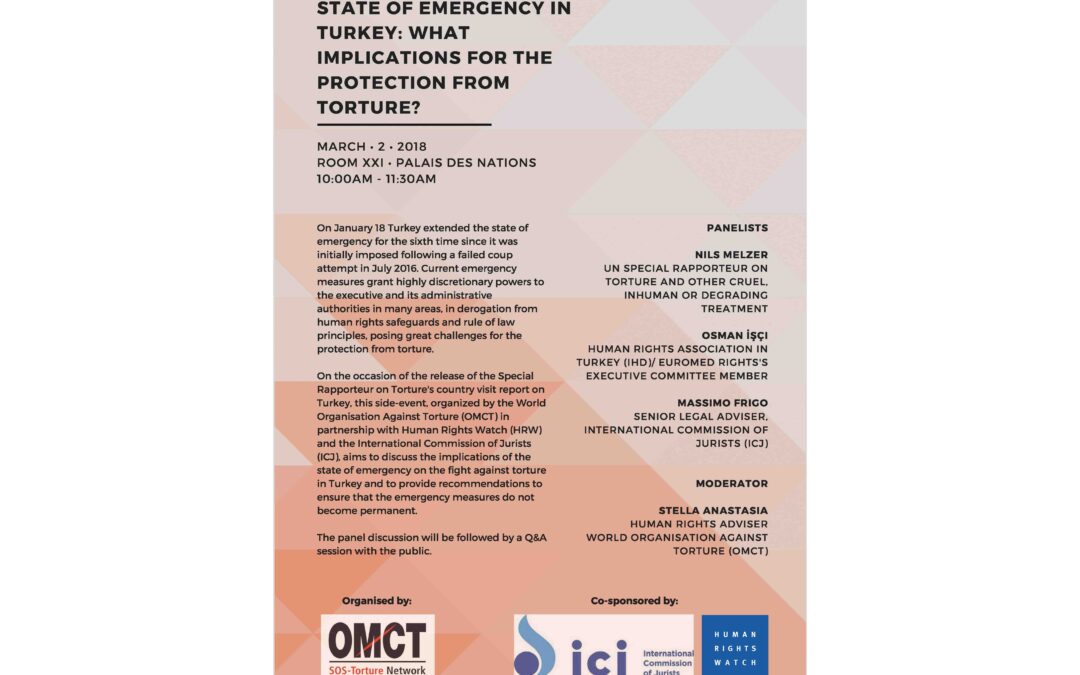
Mar 1, 2018 | Events, News
This side event at the Human Rights Council takes place on Friday, 2 March, 10:00-11:30, room XXI of the Palais des Nations. It is organized by the World Organization Against Torture (OMCT) and co-sponsored by the ICJ.
On January 18 Turkey extended the state of emergency for the sixth time since it was initially imposed following a failed coup attempt in July 2016.
Current emergency measures grant highly discretionary powers to the executive and its administrative authorities in many areas, in derogation from human rights safeguards and rule of law principles, posing great challenges for the protection from torture.
On the occasion of the release of the Special Rapporteur on Torture’s country visit report on Turkey, this side-event, organized by the World Organisation Against Torture (OMCT) in partnership with Human Rights Watch (HRW) and the International Commission of Jurists (ICJ), aims to discuss the implications of the state of emergency on the fight against torture in Turkey and to provide recommendations to ensure that the emergency measures do not become permanent.
The panel discussion will be followed by a Q&A session with the public.
Panelists:
UN Special Rapporteur on Torture and Other Cruel, Inhuman, or Degrading Treatment
Human Rights Association in Turkey (IHD)/Euromed Rights’s Executive Committee Member
Senior Legal Adviser, International Commission of Jurists (ICJ)
Moderator:
Stella Anastasia
Human Rights Adviser World Organization Against Torture (OMCT)
Turkey – Protection from Torture – News – Events – 2018 – ENG (flyer in PDF)
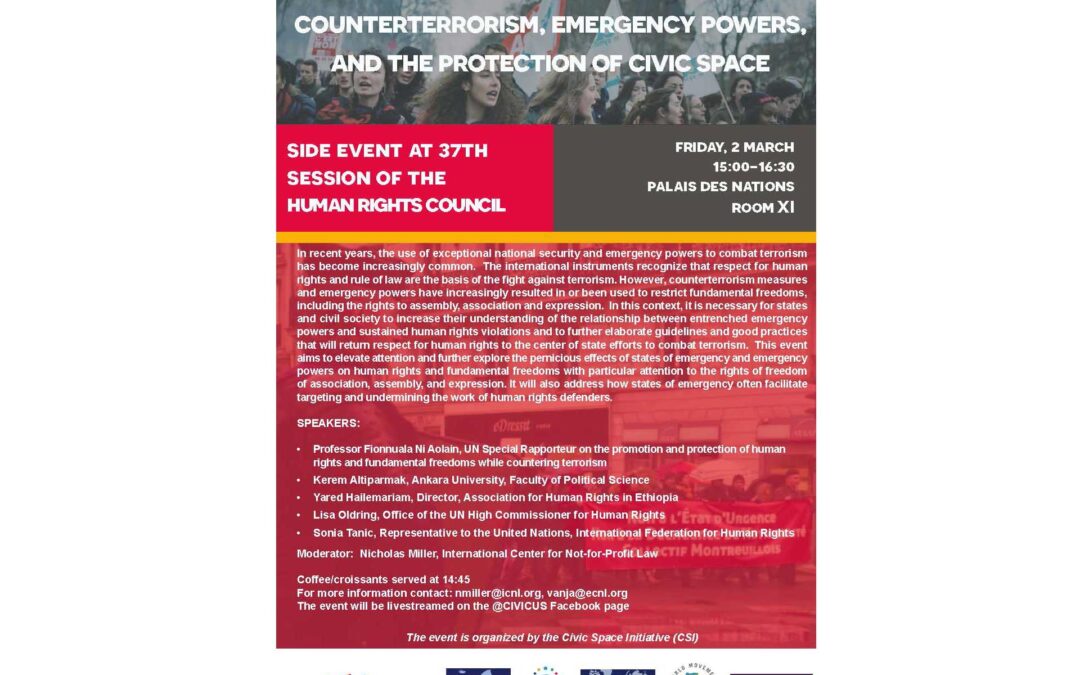
Mar 1, 2018 | Events, News
This side event at the 37th session of the Human Rights Council takes place on Friday, 2 march, 15:00-16:30, room XI of the Palais des Nations. It is organized by the Civic Space Initiative (CSI) and co-sponsored by the ICJ.
In recent years, the use of exceptional national security and emergency powers to combat terrorism has become increasingly common.
The international instruments recognize that respect for human rights and rule of law are the basis of the fight against terrorism.
However, counterterrorism measures and emergency powers have increasingly resulted in or been used to restrict fundamental freedoms, including the rights to assembly, association and expression.
In this context, it is necessary for states and civil society to increase their understanding of the relationship between entrenched emergency powers and sustained human rights violations and to further elaborate guidelines and good practices that will return respect for human rights to the center of state efforts to combat terrorism.
This event aims to elevate attention and further explore the pernicious effects of states of emergency and emergency powers on human rights and fundamental freedoms with particular attention to the rights of freedom of association, assembly, and expression. It will also address how states of emergency often facilitate targeting and undermining the work of human rights defenders.
Speakers:
- Professor Fionnuala Ni Aolain, UN Special Rapporteur on the promotion and protection of human
rights and fundamental freedoms while countering terrorism
- Kerem Altiparmak, Ankara University, Faculty of Political Science
- Yared Hailemariam, Director, Association for Human Rights in Ethiopia
- Lisa Oldring, Office of the UN High Commissioner for Human Rights
- Sonia Tanic, Representative to the United Nations, International Federation for Human Rights
Moderator:
- Nicholas Miller, International Center for Not-for-Profit Law
Coffee/croissants served at 14:45
For more information contact: nmiller@icnl.org, vanja@ecnl.org
The event will be livestreamed on the @CIVICUS Facebook page
Universal – Counterrorism and Civic Space – News – Events – 2018 – News (Event flyer in PDF)
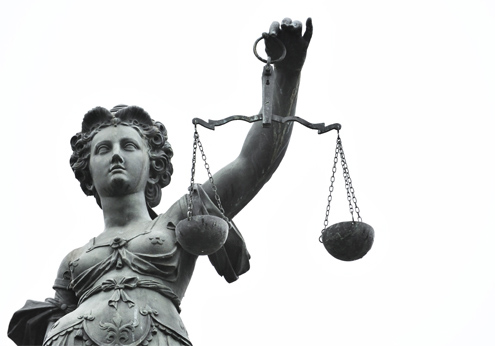
Feb 27, 2018 | Advocacy, News, Non-legal submissions
The head of the ICJ’s Centre for the Independence of Judges and Lawyers, Matt Pollard, highlighted the role of judges, lawyers and prosecutors in preventing human rights abuses, at a UN expert workshop in Geneva.The Office of the UN High Commissioner for Human Rights (OHCHR) organised the expert workshop, 21 to 22 February 2018, to discuss the role and contribution of civil society organizations, academia, national human rights institutions and other relevant stakeholders in the prevention of human rights abuses, drawing on the conclusions and recommendations of OHCHR’s study on the prevention of human rights violations.
The workshop, mandated by the Human Rights Council resolution 33/6, covered topics such as: a framework approach to prevention; human rights education; abuses by private actors, national and regional practices, planning and monitoring tools; human rights impact assessments; and the role of UN institutions.
The presentation on the role of judges and lawyers can be downloaded in PDF format here: UN-ExpertMeeting-JudgesLawyersPrevention-2018
More information about the expert workshop is available by clicking here.
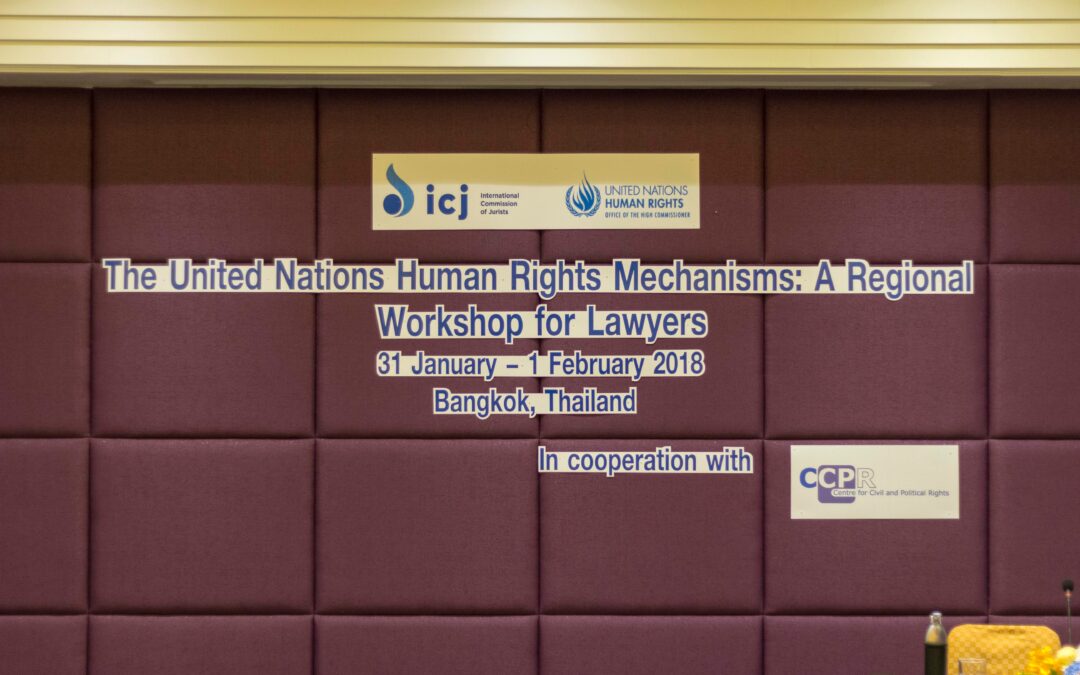
Feb 27, 2018 | Events, News
The ICJ, in collaboration with the UN High Commissioner for Human Rights Regional Office for South-East Asia (OHCHR), and the Centre for Civil and Political Rights, organised a workshop for lawyers from southeast Asia, on engaging with UN human rights mechanisms.
The two-day workshop provided some thirty lawyers from Thailand, Cambodia, Vietnam, and Lao PDR with knowledge, practical skills and expert advice about UN human rights mechanisms, with the participants themselves sharing their own experiences and expertise.
In addition to explaining what the UN mechanisms are and how they work, the workshop discussed how lawyers can use the outputs of UN human rights mechanisms in their professional activities, as well as how to communicate with and participate in UN human rights mechanisms in order to ensure good cooperation and to best serve the interests of their clients.
Sessions were introduced by presentations by the ICJ’s Main Representative to the United Nations in Geneva and OHCHR officials, followed by discussions and practical exercises in which all participants were encouraged to contribute questions and their own observations.
A special discussion of effective engagement of lawyers with Treaty Bodies was led by Professor Yuval Shany, a member of the Human Rights Committee established to interpret and apply the International Covenant on Civil and Political Rights (ICCPR).
The workshop also aimed to encourage the building of relationships and networks between the lawyers from across the region.
The workshop forms part of a broader project of awareness-raising and capacity-building for lawyers from the region, about UN mechanisms.
A similar workshop was held in January 2017 for lawyers from Myanmar.
The project has also published (unofficial) translations of key UN publications into relevant languages, and is hosting lawyers in a mentorship programme in Geneva.
More details are available by contacting UN Representative Matt Pollard (matt.pollard(a)icj.org) or by clicking here: https://www.icj.org/accesstojusticeunmechanisms/
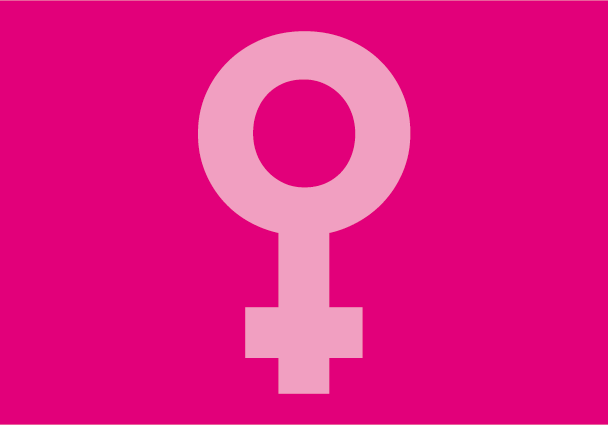
Feb 26, 2018 | Events
On 28 February 2018, the ICJ is holding a workshop on combatting sexual and gender-based violence (SGBV) in Swaziland, in cooperation with Women and Law in Southern African – Swaziland (WLSA Swaziland) and the Swaziland Action Group Against Abuse (SWAGAA).
The workshop, held as part of the ICJ’s Global Redress and Accountability Initiative, will consider the prevalence of SGBV in Swaziland, and contributing factors, and will focus on the extent to which perpetrators of such violence are, and can be, held accountable in law and in practice and the means by which victims of SGBV may better access effective remedies and reparation.
Participants will also discuss opportunities for engagement with UN mechanisms on addressing SGBV in the Kingdom of Swaziland.
The workshop is set against the backdrop of urgent recommendations adopted by the UN Human Rights Committee in 2017 on the combatting of violence against women, in respect of which Swaziland must report to the Committee by July 2018.
It comes ahead of Swaziland’s anticipated report, also due in July 2018, to the UN Committee on the Elimination of All Forms of Discrimination Against Women which in 2014 also adopted several recommendations on the combatting of violence against women.
The workshop also comes as national debates continue on the enactment of the Sexual Offences and Domestic Violence Bill, which Swaziland had committed to enact without delay at its 2016 Universal Periodic Review.
Workshop Agenda
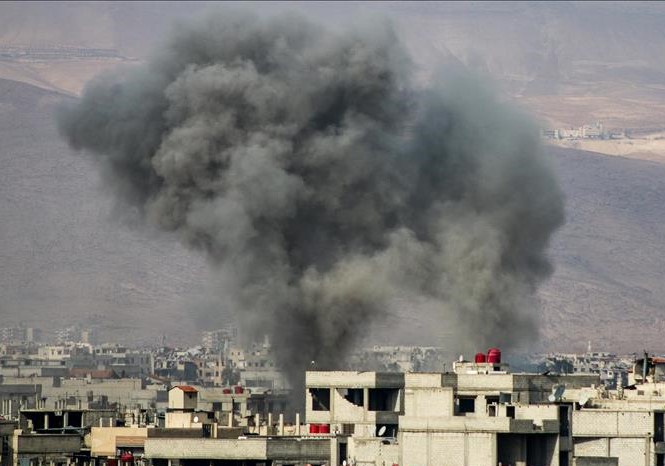
Feb 23, 2018 | News
The ICJ today called on the governments of Syria and Russia to cease all attacks on the civilian population in Eastern Ghouta.
Intentionally directing attacks against the civilian population and civilian objects, including hospitals, constitutes a war crime.
All those responsible for such crimes must be held accountable.
“The UN Security Council is blatantly failing to discharge its primary responsibility for maintaining international peace and security. It’s so paralyzed by division that it cannot even enforce its own resolutions on protecting the civilian population in Syria and ensuring unimpeded humanitarian access,” said Said Benarbia, Director of the ICJ Middle East and North Africa Programme.
“After 7 years of shielding the Syrian regime from accountability for its egregious crimes, including the use of chemical weapons, Russia is joining forces with this regime’s cynical enterprise to murder and starve its own people,” he added.
The air and artillery bombing campaign conducted by the Syrian government, with the backing of Russia, have caused hundreds of victims since Sunday.
The destruction of hospitals and the lack of basic supplies and medicines are making the living conditions of the civilian population extremely dire.
Under international humanitarian law, the Syrian government and its ally Russia have obligations to protect the civilian population and to grant rapid and unimpeded passage to humanitarian relief for the residents of Eastern Ghouta.
The UN Security Council imposed a disarmament plan concerning the Syrian chemical arsenal, yet credible reports of government use of chemical weapons against civilians continued to emerge as late as January and February 2018, in particular in Eastern Ghouta and Saraqeb.
In its last report in October 2017, the OPCW-UN Joint Investigative Mechanism established the responsibility of the Syrian government for the use of chemical weapons.
In the same month, Russia vetoed a resolution to renew the Mechanism’s mandate.
“States must act individually and collectively to stop the escalation of horrors we are witnessing in Eastern Ghouta. They must also ensure, including through any means available in their national legal systems, as well as at the regional and international level, that all those responsible for the war crimes, crimes against humanity and other international crimes committed in Syria, irrespective of their nationality, rank or status, are brought to justice,” Benarbia added.
Contact
Said Benarbia, Director of the ICJ Middle East and North Africa Programme, tel: +41 798783546, e-mail: said.benarbia(a)icj.org
Syria – Ghouta Bombing – News – Webstory – 2018 – ARB (Arabic translation in PDF)










